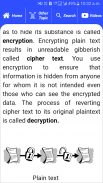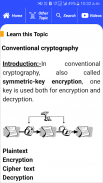








Cryptography - Data Security

وصف لـCryptography - Data Security
This App covers the basics of the science of cryptography. It explains how programmers and network professionals can use cryptography to maintain the privacy of computer data. Starting with the origins of cryptography, it moves on to explain cryptosystems, various traditional and modern ciphers, public key encryption, data integration, message authentication, and digital signatures
Types of Cryptography
1. Symmetric Key Cryptography (Secret Key Cryptography)
2. Asymmetric Key Cryptography (Public Key Cryptography)
3. HASH FUNCTION
This useful App lists 150 topics with detailed notes, diagrams, equations, formulas & course material, the topics are listed in 5 chapters. The app is must have for all the engineering science students & professionals.
The app provides quick revision and reference to the important topics like a detailed flash card notes, it makes it easy & useful for the student or a professional to cover the course syllabus quickly before an exams or interview for jobs.
Track your learning, set reminders, edit the study material, add favorite topics, share the topics on social media.
Use this useful engineering app as your tutorial, digital book, a reference guide for syllabus, course material, project work, sharing your views on the blog.
Some of the topics Covered in the app are:
1) Basics of Cryptography
2) Conventional cryptography
3) Key management and conventional encryption
4) Keys
5) Pretty Good Privacy
6) Digital signatures
7) Digital certificates
8) The OSI Security Architecture
9) Network Security
10) Types of attacks
11) Denial of service attack
12) Smurf Attack
13) Distributed Denial of Service Attacks
14) Security Mechanism
15) A Model for Network Security
16) Symmetric Ciphers
17) Classical SubstitutionTechniques
18) Classical Transposition Techniques
19) Rotor Machines
20) Steganography
21) Block Cipher Principles
22) The Data Encryption Standard
23) Differential Cryptanalysis Attack
24) Cipher and Reverse Cipher
25) Security of DES
26) The Strength of DES
27) Differential and Linear Cryptanalysis
28) Block Cipher Design Principles
29) Finite Fields
30) The Euclidean Algorithm
31) Finite Fields of The Form GF(p)
32) Polynomial Arithmetic
33) Finite Fields Of the Form GF(2n)
34) The AES Cipher
35) Substitute Bytes Transformation
36) Evaluation Criteria For AES
37) ShiftRows Transformation
38) AddRoundKey Transformation
39) AES Key Expansion Algorithm
40) Equivalent Inverse Cipher
41) Multiple Encryption and Triple DES
42) Triple DES with Two Keys
43) Block Cipher Modes of Operation
44) Cipher Feedback Mode
45) Output Feedback Mode
46) Counter Mode
47) Stream Ciphers
48) The RC4 Algorithm
49) Random Number Generation
50) Pseudorandom Number Generators
51) Linear Congruential Generators
52) Cryptographically Generated Random Numbers
53) Blum BlumShub Generator
54) True Random Number Generators
55) Key Hierarchy
56) Key Distribution Centre
57) Transparent Key Control Scheme
58) Controlling Key Usage
59) Confidentiality Using Symmetric Encryption
60) Link versus End-to-End Encryption
61) Key Distribution
62) Traffic Confidentiality
63) Prime Numbers
64) Fermat\\\'s and Euler\\\'s Theorems
65) Testing for Primality
66) The Chinese Remainder Theorem
67) Discrete Logarithms
68) Principles of Public-Key Cryptosystems
69) RSA Algorithm
70) Optimal Asymmetric Encryption Padding
71) Key Management
72) Distribution of Secret Keys Using Public-Key Cryptography
73) Diffie-Hellman Key Exchange
74) Example of Deffie Hellman algorithm
75) Key Exchange Protocols
76) Man in the Middle Attack
77) Elliptic Curve Arithmetic
Each topic is complete with diagrams, equations and other forms of graphical representations for better learning and quick understanding.
Cryptography is part of computer science, software engineering education courses and information technology degree programs of various universities.
تغطي هذه التطبيقات أساسيات علم التشفير. وهذا ما يفسر كيف المبرمجين وشبكة المهنيين يمكن استخدام التشفير للحفاظ على خصوصية بيانات الكمبيوتر. بدءا من أصول التشفير، وهو يتحرك في شرح نظم الترميز، ومختلف الأصفار التقليدية والحديثة، والتشفير بالمفتاح العمومي، تكامل البيانات، مصادقة الرسالة، والتوقيعات الرقمية
أنواع التشفير
1. متماثل مفتاح التشفير (سر مفتاح التشفير)
2. غير المتماثلة مفتاح التشفير (مفتاح التشفير العام)
وظيفة 3. HASH
يسرد هذا التطبيق مفيد 150 المواضيع مع تفصيلا الملاحظات والرسوم البيانية والمعادلات والصيغ والمواد الدراسية، يتم سرد المواضيع في 5 فصول. التطبيق هو يجب أن يكون لجميع طلبة العلم والهندسة والمهنيين.
التطبيق يوفر مراجعة سريعة وإشارة إلى مواضيع هامة مثل الملاحظات التفصيلية بطاقة فلاش، فإنه يجعل من السهل والمفيد للطالب أو المهنية لتغطية المنهج الدراسي للدورة بسرعة أمام امتحان أو مقابلة عن وظائف.
تتبع التعلم، تعيين تذكير، تعديل المواد الدراسية، إضافة المواضيع المفضلة، وتبادل الموضوعات المدرجة على وسائل الاعلام الاجتماعية.
استخدام هذا التطبيق الهندسة مفيدا لان البرنامج التعليمي الخاص بك، الكتاب الرقمي، دليل مرجعي للمنهج، المواد الدراسية، والعمل المشروع، وتبادل وجهات نظركم على بلوق.
بعض المواضيع التي تمت تغطيتها في التطبيق هي:
1) أساسيات التشفير
2) التشفير التقليدية
3) الإدارة العليا والتشفير التقليدية
4) مفاتيح
5) الخصوصية جميلة جيدة
6) التوقيعات الرقمية
7) شهادات الرقمية
8) والعمارة الأمن OSI
9) أمن الشبكات
10) أنواع من الهجمات
11) الحرمان من الخدمة الهجوم
12) الحوت هجوم
13) رفض الموزعة من الهجمات الخدمة
14) آلية الأمن
15) نموذج لأمن الشبكة
16) متماثل الأصفار
17) SubstitutionTechniques الكلاسيكية
18) تقنيات إبدال الكلاسيكية
19) آلات الدوار
20) اخفاء
21) مبادئ الصفر بلوك
22) ومقياس تشفير البيانات
23) التفاضلية تحليل الشفرات هجوم
24) الصفر والصفر عكسي
25) أمن DES
26) إن قوة DES
27) التفاضلية والخطي تحليل الشفرات
28) مبادئ التصميم الصفر بلوك
29) الحقول محدود
30) والإقليدية خوارزمية
31) محدود حقول النموذج GF (ع)
32) الحساب متعدد الحدود
33) محدود حقول GF نموذج (2N)
34) وAES التشفير
35) البديل بايت التحول
36) معايير التقييم لAES
37) ShiftRows التحول
38) التحول مفتاح اضافة المرحلة
39) AES الرئيسية خوارزمية التوسع
40) ما يعادل المعكوس
41) تشفير متعددة والثلاثي DES
42) الثلاثي DES مع اثنين من مفاتيح
43) وسائط صفر كتلة من عملية
44) التقييم وضع الشفرات
45) خرج راجعة الوضع
46) وضع عداد
47) تيار الأصفار
48) وRC4 خوارزمية
49) عدد الجيل عشوائية
50) مولدات عدد المزيف
51) مولدات الخطي Congruential
52) أرقام عشوائية ولدت الكتابة بطريقة سرية
53) بلوم BlumShub مولد
54) صحيح مولدات عدد عشوائية
55) مفتاح التسلسل الهرمي
56) مركز التوزيع الأساسي
57) نظام التحكم الرئيسية شفاف
58) السيطرة على استخدام المفتاح
59) السرية عن طريق تشفير متماثل
60) رابط مقابل التشفير من النهاية إلى النهاية
61) التوزيع الأساسي
62) السرية المرور
63) رئيس أرقام
64) نظريات فيرما \\\ الصورة ويولر \\\ الصورة
65) اختبار لبريماليتي
66) ومبرهنة الباقي الصيني
67) المتقطعة اللوغاريتمات
68) مبادئ بين القطاعين العام ومفتاح نظم الترميز
69) RSA خوارزمية
70) الأمثل المتناظر تشفير الحشو
71) إدارة المفاتيح
72) توزيع المفاتيح السرية عن طريق القطاعين العام ومفتاح التشفير
73) ديفي هيلمان تبادل مفتاح
74) مثال على خوارزمية ديفي هيلمان
75) مفتاح بروتوكولات تبادل
76) رجل في هجوم الأوسط
77) الاهليلجيه المنحنى الحساب
كل موضوع كاملة مع الرسوم البيانية والمعادلات وغيرها من رسوم بيانية للتعلم وفهم أفضل سريع الأشكال.
التشفير هو جزء من علم الحاسوب، هندسة البرمجيات دورات تعليمية وبرامج درجة تكنولوجيا المعلومات من مختلف الجامعات.


























